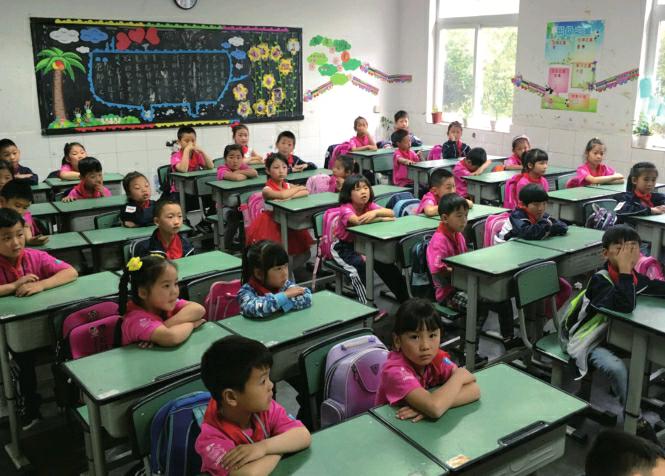Survive and Prosper
2017-06-15ByLuYan
By+Lu+Yan
May 12, 2008 is a date that Chinese people can never forget. On that day, an 8.0-magnitude earthquake hit southwest Chinas Sichuan Province and 69,227 people lost their lives in the disaster.
Gan Hongyan is a local villager whose niece died in the tragedy. Now, she works as a tourist guide in her hometown, Yingxiu—the epicenter and one of the worst-hit areas—telling visitors about that day. Nine years have passed, yet she still cries when telling stories she has already told countless times. “Many children were having class at that time,” she told Beijing Review. “They were buried before they realized what was going on, and some of them never got out.”
Compared to schools that lost so many lives, Zhuwa Primary School was lucky. Located in Pidu District of Chengdu, the provincial capital of Sichuan, and about 50 km from the epicen- ter, none of its students were killed or injured. Although the school building split in half, the school grounds were not as severely affected as the adjacent area, which was devastated in the quake.
“We are very grateful,” said Yang Shikai, the schools principal. “Since the earthquake, weve received a lot of help from the government and society and have grown to be one of the best village primary schools.”
Aided recovery
Yang has been working at Zhuwa for 24 years as a teacher, dean of studies, vice principal and principal. He told Beijing Review that he had grown with the school. “Ive witnessed with my own eyes the schools transformation.” What impresses Yang most is the huge change that has taken place since the earthquake.
In the past, the quality of Zhuwas teaching facilities was considered mediocre. The school was shabby; there was neither a running track nor a library. After the earthquake tore the school building in half, the teachers and students faced worse conditions.
All this changed when Han Fei, Corporate Affairs Manager of Nestlés west China division and also a Sichuan local, discovered the schools diffi cult situation. He decided to encourage his coworkers to help the school and proposed it as a potential recipient of funding under NestléChinas charity program.
The reason why the company chose Zhuwa among the many schools affected by the earthquake, according to Han, was that it had received far less public attention than other schools as it had no injuries or casualties. “But it was still having a hard time returning to normal operation. Thats why we decided to lend them a hand,” Han said.
One of the immediate actions NestléChina took was to rebuild the school. Within a few months, a new building was constructed at a cost of 2 million yuan ($290,000), enabling students to get back to the normal school routine. In 2009, a library was built and filled with books donated by NestléChina employees.
Since 2012, the school has held an annual art festival. Nestlé China representatives from different branches come to the school and celebrate with the students, teachers and parents. They also prepare classes on unconventional life skills like fi refi ghting, cooking and storytelling in the hope of sharing their own experiences with the village students.
“My daughter is always excited to meet them,” said Li Juan, mother of fourth-grade student Zhu Like. “[That] they bring gifts is one thing. Whats more important is, what they teach has widened the childrens horizons, showing them a different world from the one they live in.”
Besides holding annual events to enable students to know more about the outside world, the school has also made changes in its educational practices. With help from NestléChina, Zhuwa has set up a program that encourages students to make progress in their schoolwork. Instead of rewarding only the top students, the scheme provides a scholarship to every student whose exam score improves.Sometimes, over one third of the students receive this incentive, which motivates them greatly. While such changes require funding, Yang said this is no longer a problem. Zhuwa receives an annual government subsidy of 700 yuan ($102) per student. When the school faces fi nancial diffi culty, it applies to local educational authorities for more support.
“The local government is willing to give us more funding because they know we are doing well and well make good use of the money,”Yang said.
With support from both the government and business, Zhuwas facilities have been upgraded—an artificial running track was built, and classrooms were renovated.
Improving the teaching and learning environment and facilities serves one purpose: to advance the quality of teaching, which is the schools priority, according to Yang.
After years of joint efforts, Zhuwa with its 401 students and 28 teachers has become an exemplary village primary school in Pidu. In a comprehensive assessment of the quality of teaching in the district, it has received the top award for fi ve consecutive years, which is a major achievement for a village school.
“Now, we are no longer making a cake, but icing it,” Yang said.
Despite all the achievements the school has made, there are still many challenges ahead. For a village school, its difficult to recruit quality new teachers, mostly because of the relatively low income and underdeveloped environment compared with what teachers in cities can expect.
Moreover, some of the teachers the school has are reluctant to adopt new teaching and management methods.
To overcome such conservatism, the school employs teachers in such a way as to put their abilities to best use. Through speaking, teaching and physical contests, the school identifi es each teachers strengths and places them in the most suitable position, encouraging all teachers to shine.
Yang said its not only students who need motivation, but also teachers. He expressed the hope that the government will introduce policies to attract more teachers to village schools.
Sharing love
In some way, the earthquake in 2008 provided an opportunity for Zhuwa, enabling it to grow from an underdeveloped and unimpressive school into an advanced and vibrant one.
For more than nine years, the school has received fi nancial assistance. After its transformation, it wants to give back by helping others in need.
Earlier this year, Zhuwa donated water purification equipment to Jiasikong Primary School, a small village school located on the Qinghai-Tibet Plateau in remote Daofu County of Sichuan. Nestlé China donated similar equipment to Zhuwa in 2014 so as to improve students health by ensuring drinking water safety. Now the school wants to share the benefi t and pass on the kindness to other schools.
This is just one aspect of the assistance. As part of exchange activities between the two schools, some core members of Zhuwas teaching staff have taught at Jiasikong under a volunteering program.
Yan Minshu began volunteering at Jiasikong in 2016. This is his second stint. He uses the words “shocking and unimaginable” to describe his first impression of local students lives in the underdeveloped, mountainous area. Some children have to walk over 20 km from home to school, and some have to climb high mountains. “I hope more good education materials can be made available to those children. We want to bring them knowledge which can change their destiny,” Yan said.
“Through this program, we hope that children from mountainous areas can also enjoy the changes we experienced,” he added. “Its a relay of love and care.”
